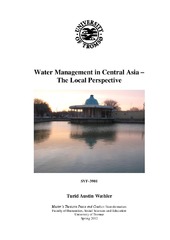Water management in Central Asia : the local perspective
Author
Wæhler, Turid AustinAbstract
Water is an increasing source to conflict throughout Central Asia. The problems of water management are caused by lack of efficient cooperation between the Central Asian states, as the states fail to treat the question of water management in a holistic manner. Rather than relating to water management from a regional perspective, the states are putting their own national needs first. To effectuate water management in Central Asia, measures to enhance cooperation mechanisms may thus be helpful.
This thesis explores whether including actors from the local level may contribute to mitigate the water situation in Central Asia. In order to provide a basis for thorough analysis of whether local actors should be included in water management to a larger extent, the study applies a broad selection of interviews conducted with various actors engaged in water management in Central Asia. Perspectives within the center-periphery theory provide a theoretical framework for analyzing local involvement. In order to provide a basis for pragmatic discussion of how local actors can be included in water management, the concept of center-periphery is deconstructed into more tangible elements. It is my opinion that this theoretical approach allows me not only to better understand the mechanisms behind water management, but that it also provides me with a tool for pointing out some suggestions for how the water situation may be mitigated.
Based on the empirical findings and the theoretical discussion, the thesis argues that involving actors from the local level is likely to build trust between actors located at different levels of governance, thus facilitating cooperation.
Publisher
Universitetet i TromsøUniversity of Tromsø
Metadata
Show full item recordCollections
Copyright 2012 The Author(s)
The following license file are associated with this item:


 English
English norsk
norsk
